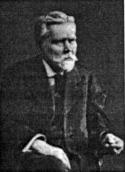Vovk Fedir
Fedir (Theodore) Vovk (5 (17) March 1847 – June 29, 1918; ukrainian vovk means wolf) – Ukrainian ethnographer and anthropologist.
Born in the village Kryachkivka (now Pyryatyn district, Poltava region.) in the family of a retired officer. He studied at Nizhyn school, in 1865 – 1866 years – in Novorossiysk University (Odessa). In 1866 he transferred to the University of Kiev, and in 1871 graduated the Faculty of Natural Sciences.
Vovk met with members of the Old Hromada (Community, Kyiv) and actively participated in many of its endeavors, particularly in the work of South-western Division of the Russian Geographical Society. In 1876 – 1878 years Vovk stayed in Geneva, where he helped M. P. Dragomanov the publication of the magazine "Hromada (Community)".
Returning to Russian empire, Vovk found that he could face arrest. In 1879 he emigrated to Romania, where he collected ethnographic information about Ukrainians, and in 1883 came back to Geneva. From 1887 to 1905 he lived permanently in Paris, where he continued to improve in anthropology, ethnography and archeology.
His stay in Paris and his acquaintances in French scientific circles Vovk used to spread knowledge about Ukraine and promoting Ukrainian science.
After the revolution in December 1905 Vovk received permission to return to the Russian empire and moved to St. Petersburg, where he became the head of department of the Russian Museum. In 1907, at age 60, he took the lowest position (privat-docent) at the Department of Geography University of St. Petersburg – while his peers have long been distinguished professors. One had to make another revolution in order to Kyiv University chose Vovk head the Department of Geography and Ethnography (29 October 1917). In June 1918 Vovk moved from St. Petersburg to Kyiv, but the road was ill severe influenza (so-called "Spanish flu") and died at the station Zhlobin. He is buried in Zhlobin (now Gomel region, Belarus).
Scientific and journalistic heritage F. K. Vovk has more than 450 works. In its entirety it is not collected and not republished, reprinted (1928, 1995) only the selected works on ethnography and anthropology.
Portrait F. K. Vovk that we present, taken from the book "Letters of Mykhailo Hrushevsky" (K.: 2001, vol. 2, p. 93).
Theodore Vovk and Michael Hrushevsky
1. Distant acquaintance of scientists took place in 1895, when Hrushevsky offered Vovk to publish his works in journals Shevchenko Scientific Society, and from 1896 – to become an editor ethnographic publications of Society. Vovk agreed to both proposals.
2. lively correspondence between Hrushevsky (Lviv) and Vovk (Paris) lasted until the end of 1898, when there was a misunderstanding between them in the preparation of regular publications. It was clean distinction between working associates, which touched publishing. The principle of their views on the development of Ukrainian science coincide. After 1898 Hrushevsky continued to support the publication of "Material to the Ukrainian ethnology" and "Ethnographic collection" edited by Vovk.
3. In 1903, thanks to efforts by F. Vovk, Hrushevsky invited to read lectures on Ukrainian history at the Graduate School of Social Sciences (Paris) – public educational institution, founded by Russian immigrants.
4. In 1904 Hrushevsky in turn invited F. Vovk to Lviv – take a course on Ukrainian Anthropology and Ethnography in summer courses of Ukrainian studies.
5. In 1903 – 1906 years F. Vovk spent four expeditions to Galicia, Bukovina and Transcarpathia collecting anthropological materials. These expeditions were financed and secured by Shevchenko Scientific Society and Hrushevsky personally cared of this case.
6. F. Vovk helped to replenish Museum of Shevchenko Scientific Society, buying in Paris exhibits; need the funds were allocated through Hrushevsky.
7. After moving F. Vovk to St. Petersburg his correspondence with Hrushevsky touched mainly on publication papers F. Vovk, in particular, Mizyn Paleolithic site, and preparing encyclopedic collection "Ukrainian people in the his past and present", edition of which was in St. Petersburg.
M. Zh., 23 February 2017

